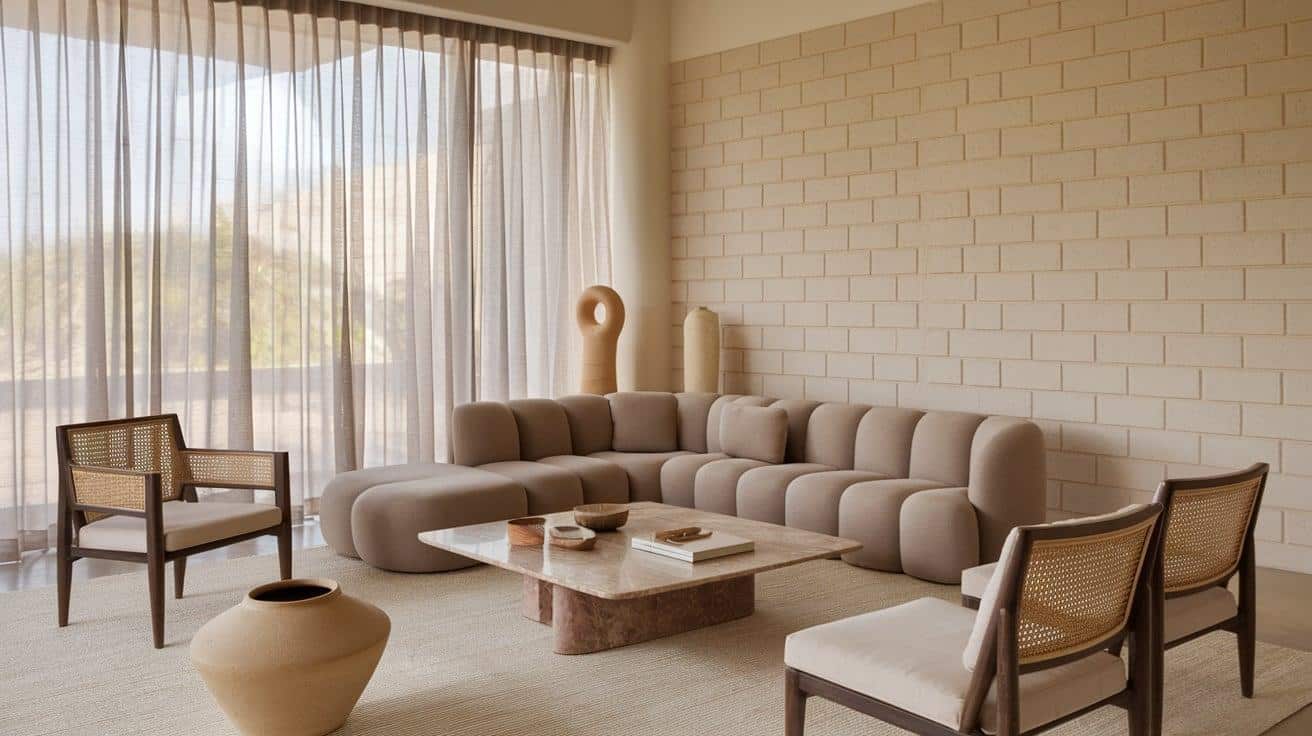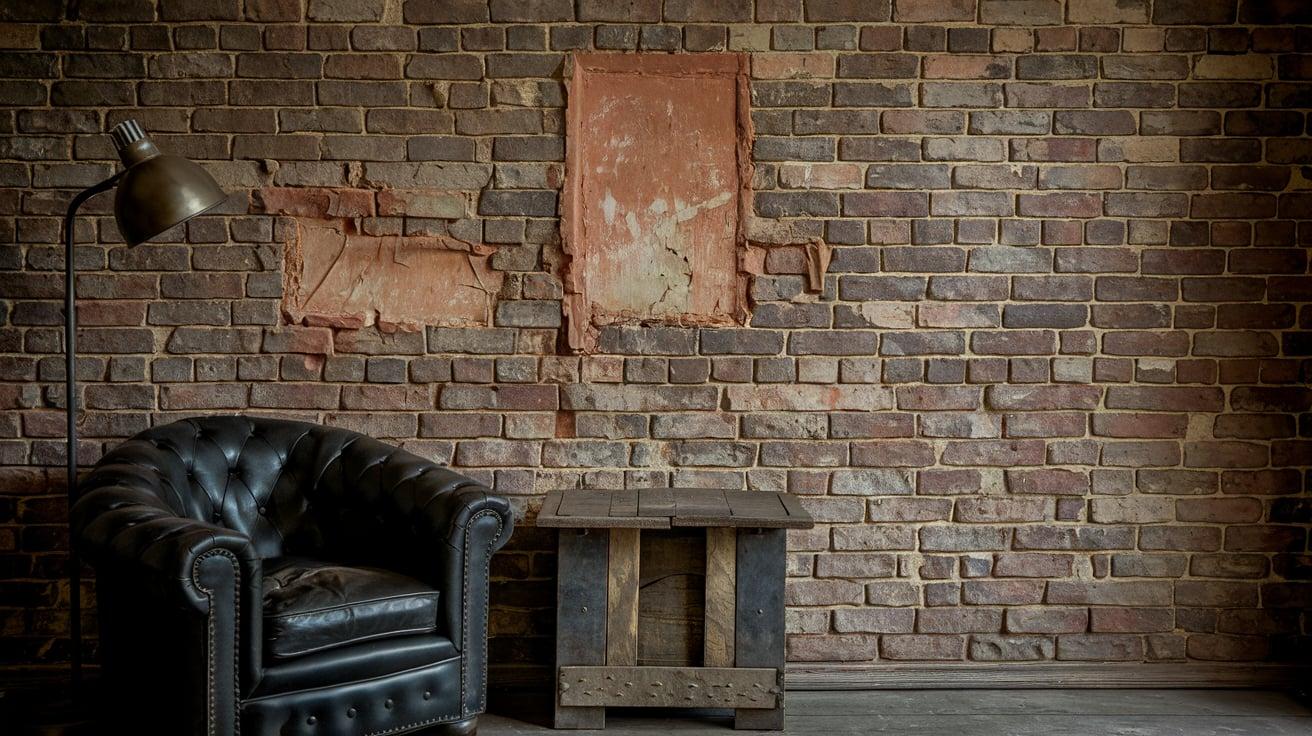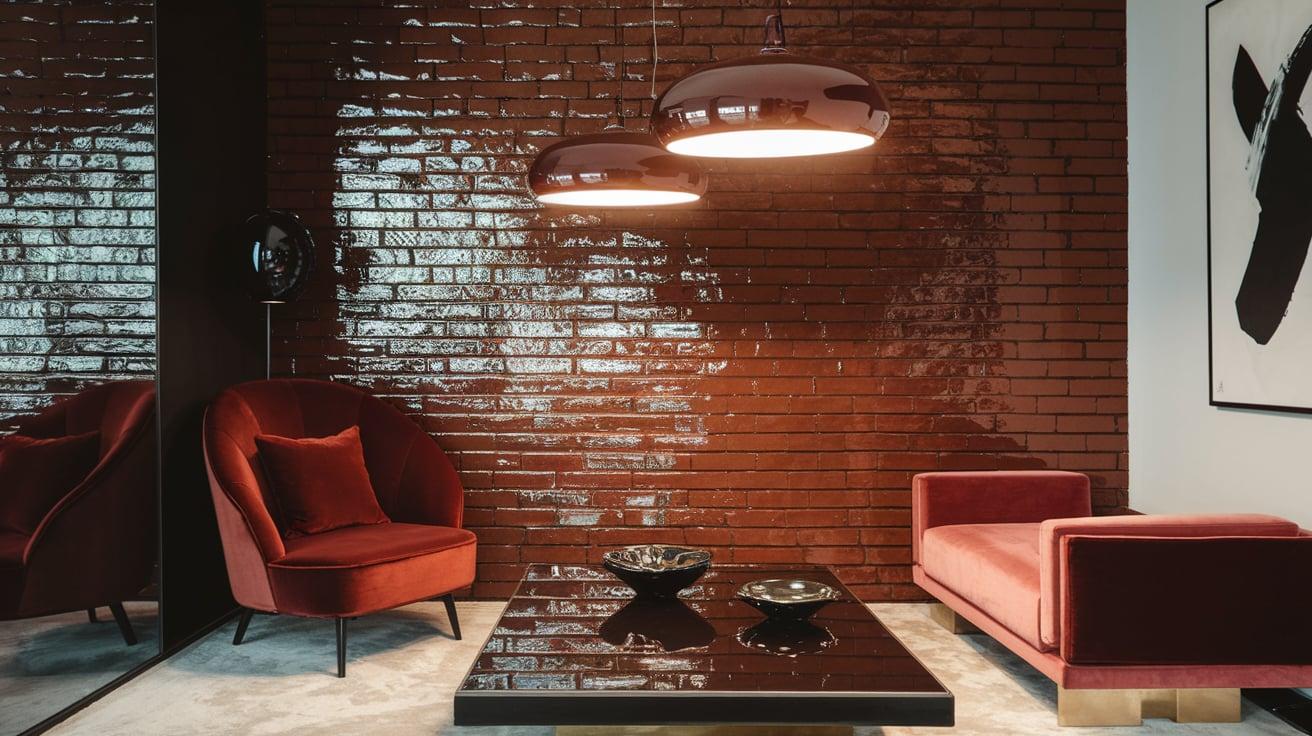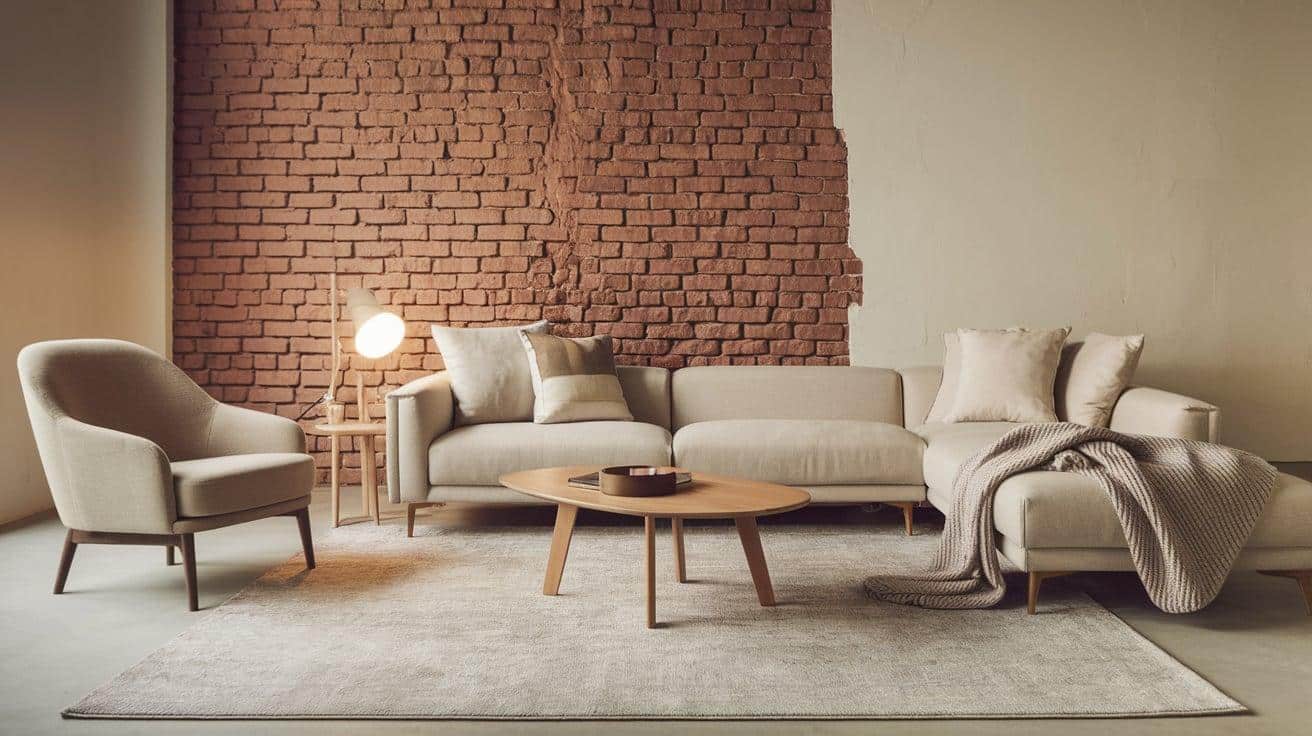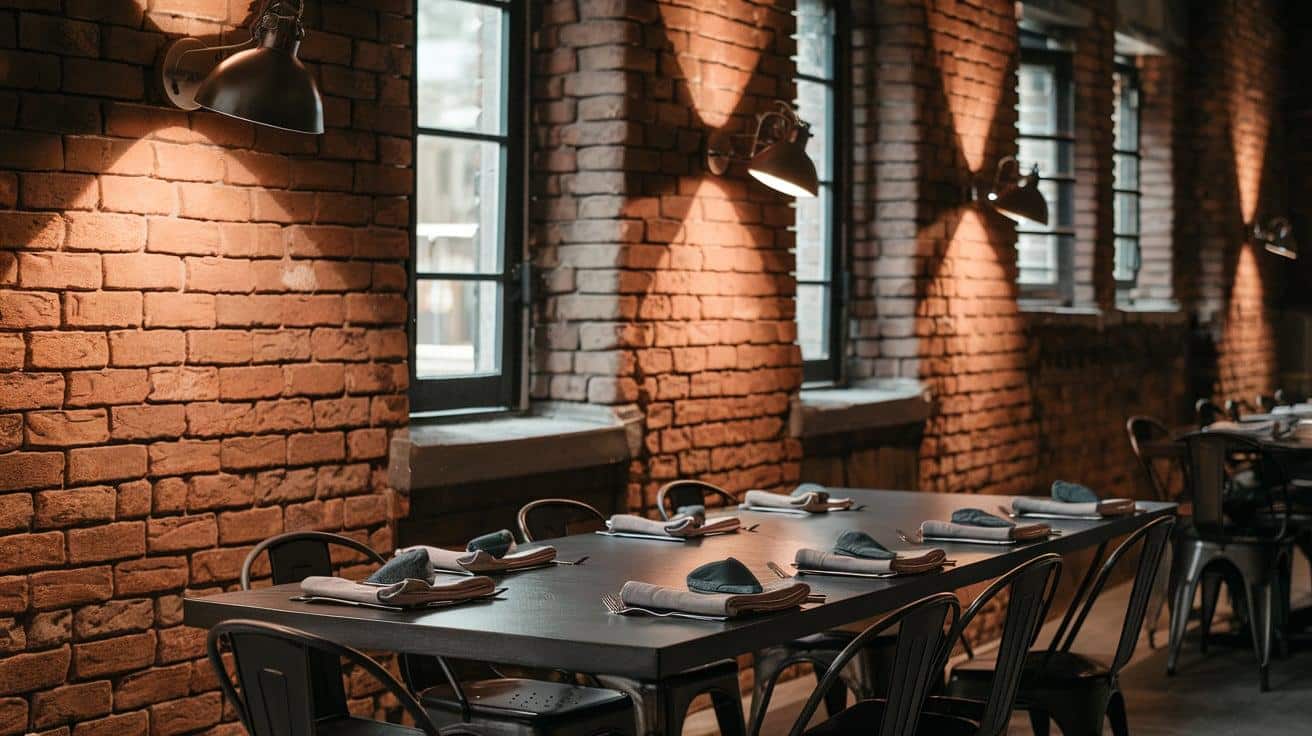In today’s post, I’ll share 49 creative ideas for brick accent walls that will transform any room in your home.
I’ve compiled these exact techniques and styles based on my experience working with top interior designers and home renovation experts and helping homeowners add character to their living spaces.
Let’s explore how brick accent walls can become the focal point of your home, adding texture, warmth, and timeless appeal to any room. From modern minimalist approaches to rustic farmhouse designs, you’ll find ideas that work for every style and budget.
This guide has something for everyone, whether you’re looking to highlight natural brick tones or experiment with painted finishes.
What is a Brick Accent Wall?
A brick accent wall is a single wall in a room made of brick, which is the main material. It creates a striking visual contrast with the surrounding walls.
Unlike full brick rooms, an accent wall focuses the textural impact on one area, making it a focal point that draws attention while adding depth to the space.
Brick accent walls can be made from real brick, thin brick veneer, or even faux panels that mimic the look of authentic masonry.
The beauty of a brick accent wall is its ability to add character without being too heavy. It brings a raw, organic element into your home and nicely complements smoother surfaces and modern furnishings.
This targeted approach allows you to enjoy brick’s warm, textured appeal without the cost or complexity of installing it throughout an entire room.
Why are Brick Walls a Top Choice for Interior Design?
Brick walls have become a favorite in interior design for good reasons. They add genuine textures that few other materials can match, creating visual interest through their natural variations in color, shape, and surface details. This depth makes spaces feel more layered and thoughtful.
Beyond looks, brick walls connect homes to history and craftsmanship. They remind us of old factories, warehouses, and historic buildings, bringing that sense of permanence and story into modern spaces.
Their earthy, natural tones provide warmth that can make even large rooms feel cozy and welcoming.
From a practical standpoint, brick is both sturdy and adaptable. It works with almost any design style, from industrial to farmhouse to modern, and can be left natural, painted, or whitewashed to suit your taste. This flexibility ensures that your brick accent wall will remain relevant even as other design trends come and go.
Classic & Timeless Brick Styles: 12 Iconic Looks
1. A Rich and Textured Statement
Natural red brick brings raw character to any space. The rich, earthy tones of exposed red brick instantly add warmth and depth to rooms that might otherwise feel flat. This style pairs well with leather furniture and wooden elements in living rooms to create a balanced, lived-in atmosphere.
2. Perfect for Kitchens: A Bold and Inviting Look
Red brick backsplashes or accent walls make an eye-catching statement in kitchen spaces while connecting to the heart of home cooking. The varied tones, from deep clay reds to subtle oranges, create a backdrop that feels solid and full of life.
3. Enhancing Home Offices with a Grounded Aesthetic
In-home offices or studies, exposed red brick creates a focused atmosphere that feels grounded and stable. The natural texture helps absorb sound while providing a distraction-free background that’s still visually interesting.
4. The Best of Both Worlds: Texture Meets Lightness
Whitewashed brick offers the perfect middle ground between raw texture and light, bright walls. This finish allows the natural brick pattern to show through while softening the overall look with a layer of white that isn’t fully opaque.
5. Creating a Calm and Cozy Bedroom Atmosphere
In bedrooms, whitewashed brick creates a serene backdrop that’s neither too stark nor too busy. The subtle texture shows through just enough to add interest without competing with bedding or artwork.
6. Maximizing Light in Small or Dimly Lit Spaces
For sunrooms or spaces with limited natural light, whitewashed brick helps bounce light around while maintaining more character than plain white walls. This approach works especially well in smaller spaces where full-color brick might feel too heavy.
7. Gray Painted Brick: The Minimalist’s Choice
Gray-painted brick offers a fresh take on traditional masonry, providing a clean canvas that fits perfectly with modern and minimalist designs. The uniform color lets the texture become the star while fitting into more controlled color schemes.
8. Black Brick Walls: Dramatic and Sophisticated
Black painted brick creates drama and depth, making a bold statement in any room. This high-contrast approach works wonderfully in spaces with good natural light or as a backdrop for colorful art and furnishings.
9. Soft Beige and Taupe: Understated Refinement
Neutral-toned brick in soft beige or gentle taupe offers subtle texture without demanding attention. These quieter colors allow brick walls to add depth without dominating the design, making them perfect for calm, collected spaces.
10. The Timeless Beauty of Salvaged Brick
Reclaimed brick tells a story through its worn edges and varied colors. These bricks, salvaged from old buildings, bring authentic history into your home with their unique patina and character, which cannot be replicated.
11. Unique Color Variations for Visual Interest
The natural wear patterns and color variations in reclaimed brick create walls that feel genuinely aged rather than artificially distressed. Each brick carries marks of its previous life, adding layers of visual interest.
12. The Warmth of History in Dining and Gathering Spaces
When used in dining areas or gathering spaces, reclaimed brick creates an atmosphere of timeless comfort. Their imperfections remind us of places that have witnessed countless conversations and shared meals over many years.
Innovative Treatments: 10 Ways to Customize Brick Walls
13. Sandblasted Brick: A Softly Weathered Look
Sandblasted brick creates a weathered, time-worn appearance that adds subtle texture without feeling too rough. This process strips away the outer layer of brick, revealing the softer interior with its natural variations and imperfections.
The result is a wall with more visual depth that catches light in interesting ways throughout the day.
14. Distressed Brick: Instant Character and Vintage Appeal
Distressed brick mimics decades of wear in a controlled manner. By carefully chipping corners and edges, this treatment gives new brick an instant sense of history. The varied surface creates small shadows and highlights that make the wall feel more three-dimensional and engaging to the eye.
15. Rough-Hewn Brick: Raw, Handcrafted Texture
Rough-hewn brick features uneven surfaces and irregular edges, which give your accent wall a truly handcrafted quality. This less uniform finish works wonderfully in spaces where you want to introduce a sense of rustic charm without the perfectly aligned look of standard brick.
The varying depths create a wall that changes character as light shifts across its surface.
16. Clear-Sealed Brick: Enhanced Natural Colors with a Soft Sheen
Clear-sealed brick maintains the natural color of your masonry while adding a subtle sheen that makes colors appear richer and more intense. This treatment protects the brick while giving it a clean appearance that works well in kitchens and other high-traffic areas.
17. Tinted Sealer: A Subtle Color Shift Without Hiding Texture
Tinted sealer adds a wash of color while letting the brick texture show through completely. This approach allows you to shift the color tone slightly without fully painting the brick, maintaining authenticity while better coordinating with your overall color scheme.
18. High-Gloss Sealed Brick: A Modern, Reflective Finish
High-gloss sealed brick creates a more dramatic, contemporary look that reflects light and adds an unexpected modern twist to traditional masonry.
This finish transforms brick from purely rustic to something more refined, creating an interesting tension between the old-world material and its sleek surface.
19. Herringbone: A Zigzag Effect for Movement and Flow
Herringbone patterns, created with bricks arranged in a zigzag formation, create visual movement. This dynamic layout draws the eye across the wall, making spaces feel wider or taller depending on the direction of the pattern.
20. Chevron: Structured, Symmetrical Angles for a Sleek Look
Chevron arrangements position bricks at matching angles that meet in clean, continuous lines. This creates a more formal, structured look than herringbone while adding significant visual interest and direction to your accent wall.
21. Staggered Brick: The Timeless, Natural Brickwork Pattern
Staggered brick layouts offset each row to create the classic brick wall pattern we all recognize. This timeless arrangement allows the natural variations in brick color and texture to shine without competing with a more complex pattern.
22. Stacked Brick: Clean, Modern Lines with Vertical Emphasis
Stacked brick positions each brick directly above the one below it, creating clean vertical lines that can make ceilings appear higher. This more modern, grid-like pattern brings order and precision to the naturally irregular texture of brick.
Smart Material Pairings: 10 Ideas to Elevate Your Brick Wall
23. Floating Shelves: A Functional and Stylish Contrast
Floating shelves made from natural wood create a beautiful contrast against brick walls. The smooth, warm wood surfaces stand against the textured background, offering visual interest and practical storage.
Try open shelving in kitchens or living rooms to display items while maintaining the brick’s visibility. Oak or walnut tones complement the earthy reds and browns found in natural brick.
24. Rustic Beams: Architectural Interest with a Timeless Appeal
Rustic beams installed horizontally or vertically against brick add architectural interest and a sense of history. These structural-looking elements balance brick walls by introducing linear components that guide the eye across the space.
Wooden beams can make the brick wall feel more grounded and connected to the rest of your home’s design in rooms with high ceilings.
25. Wooden Mantels: A Cozy and Natural Focal Point
Wooden mantels are perfect focal points for brick fireplaces or accent walls. The natural grain patterns in wood create an organic partnership with brick textures.
A substantial wood mantel offers a sturdy display area while softening the harder edges of masonry with its warm tones and natural feel.
26. Marble Inserts: A Fusion of Rustic and Refined
Marble inserts or shelving against brick create an unexpected but stunning blend of rustic and refined. The polished, cool marble surface makes a dramatic statement against the brick’s rough, warm texture.
Even small touches of marble, like shelf brackets or inlaid sections, can add surprising sophistication to an otherwise casual brick wall.
27. Concrete Counters: Industrial and Practical with a Soft Edge
Concrete counters or furniture pieces paired with brick walls play with similar textures in different forms. Both materials have an honest, industrial quality, but concrete’s smoother finish and cooler tones provide subtle contrast.
This pairing works especially well in kitchens and dining areas, where the practicality of both materials shines.
28. Polished Concrete Floors: A Seamless Flow of Texture
Polished concrete floors below brick walls create a seamless texture flow from floor to wall. This combination feels thoughtfully designed while remaining unfussy and practical. The reflective quality of polished concrete also helps bounce light around the room, preventing the brick from feeling too heavy or dark.
29. Steel Framing: Defining Brick with Bold, Structural Lines
Steel framing or trim pieces installed alongside brick highlight the industrial heritage of both materials. Black or dark metal elements create strong visual lines that frame brick sections, adding structure to the naturally irregular pattern.
Consider metal-framed artwork, mirrors, or even window-like dividers to enhance this pairing.
30. Glass Shelving: Light, Airy Storage that Keeps Brick in Focus
Glass shelving against brick provides functional storage while maintaining visual lightness. The transparency allows the brick to remain visible through the shelves, preserving the wall’s impact while adding useful surface area.
This combination works brilliantly in bathrooms and kitchens where clutter needs to be contained without adding visual weight.
31. Copper & Brass Accents: Warm Metallic Highlights
Copper or brass accents bring warmth and shine to brick walls. Over time, these metals develop beautiful patinas, evolving alongside brick’s timeless quality.
Even small touches, such as light fixtures, switch plates, or decorative objects, can create sparkling moments of interest against the matte texture of the brick.
32. Metallic Lighting Fixtures: Enhancing Brick’s Texture with Shadows and Depth
Metal lighting fixtures strategically placed to wash light across brick surfaces enhance texture by creating shadows in the mortar lines and brick face. Wall sconces, track lighting, or pendant lights with metallic finishes add function while serving as decorative elements that complement the industrial feel of exposed brick.
Functional & Architectural Enhancements: 7 Transformative Additions
33. Recessed Alcoves: Built-in Display Areas with Depth
Recessed alcoves carved into brick walls create natural display areas that feel intentional and unique. These inset spaces can be sized to showcase art, collectibles, or useful items while adding architectural interest.
The depth difference between the main wall and the alcove creates natural shadows that highlight the objects within, drawing attention to your favorite pieces.
34. Integrated Bookshelves: A Timeless Blend of Storage and Style
Built-in bookshelves integrated with brick combine storage with style. By framing shelving sections with brick surrounds, you create a customized look that feels permanently part of your home.
This approach works particularly well in studies or living rooms, where books and brick add a sense of warmth and substance.
35. Asymmetrical Niches: Playful, Structured Organization
Asymmetrical niches of varying sizes bring playful organization to brick walls. Rather than uniform shelving, these differently sized openings create visual rhythm while providing specific spots for items of various heights and widths.
The contrast between the structured brick and the open spaces makes both elements more interesting.
36. Floor-to-Ceiling Brick: A Dramatic Focal Point
Floor-to-ceiling brick surrounds make fireplaces the undeniable focal point of any room. This treatment draws the eye upward, enhancing ceiling height while centering the room around the hearth.
This approach’s verticality creates a strong architectural statement that anchors seating areas and establishes a natural gathering point.
37. Extended Brick Hearths: A Seamless Transition with Added Depth
Brick hearths that extend outward into the room create transition zones between the flooring and the fireplace. This brick extension beyond the wall plane adds depth and substance to the fireplace area, making it feel more substantial and inviting.
The projected hearth also provides practical protection for flooring and allows for the display of seasonal items or fireplace tools.
38. Inset TV Walls: A Built-in Frame for Technology
Inset television areas surrounded by brick create the perfect frame for screens while hiding cables and equipment. By recessing the TV slightly into the wall, you minimize its visual impact when turned off, allowing the brick texture to remain the primary focus.
This thoughtful integration helps solve the common design problem of technology competing with architecture.
39. Media Component Niches: Hidden Storage with Easy Access
Media component niches built alongside TV areas provide smart, accessible storage to organize entertainment systems. These purpose-built openings can be sized exactly for audio equipment, gaming consoles, or media collections, keeping everything within reach but visually contained.
The brick surround adds character to what might otherwise be purely utilitarian storage.
Interior Styling: 7 Tips to Enhance the Brick Aesthetic
40. Neutral-Toned Furniture: A Soft Counterpoint to Brick’s Texture
Neutral-toned furniture provides a calm counterpoint to the busy texture of brick walls. Soft beige, gray, or cream pieces allow the wall to remain the focal point while creating a relaxing, cohesive look.
These quieter colors prevent visual competition and let the eye move easily between the furniture and the brick feature without feeling overwhelmed.
41. Contrasting Styles: Mixing Modern and Rustic for Visual Tension
Contrasting furniture styles can create interesting tension with brick walls. Pair sleek, modern pieces with rustic brick for an unexpected mix that feels curated rather than matched.
This approach works especially well with clean-lined sofas or chairs placed against textured brick, highlighting the qualities of both elements through their differences.
42. Plush Rugs: Softening the Feel of a Brick Space
Soft textiles help balance the hardness of brick surfaces. Plush area rugs, especially those made from natural fibers like wool or cotton, add comfort underfoot while softening the overall feel of a brick-accented room.
Look for rugs with subtle patterns that complement rather than compete with the brick’s natural texture.
43. Layered Window Treatments: Depth and Acoustic Benefits
Layered window treatments add depth while improving acoustics in brick-walled rooms. Combining sheer panels with heavier drapes creates visual softness and helps manage the sometimes challenging acoustics of spaces with hard surfaces.
Choose fabrics that pick up secondary colors from your brick to tie the elements together.
44. Mixing Upholstery Textures: A Multi-Dimensional Look
When paired with brick, varied upholstery textures create a rich, multi-dimensional space. Mix smooth leather, nubby linen, and soft velvet to create a tactile experience that complements the rough texture of brick walls.
This layering approach makes a room feel thoughtfully composed and inviting to touch.
45. Organic Contrast, Choosing the Right Plants
Living plants create beautiful organic contrast against brick backgrounds. The soft, flowing forms of foliage stand out dramatically against the brickwork’s structured, linear patterns.
Trailing plants like pothos or ivy can soften the hard edges, while structural plants like fiddle leaf figs or snake plants echo the brick’s strength with their vertical lines.
46. Oversized Art: Making a Bold Statement Against Textured Walls
Oversized art pieces make strong statements against brick backgrounds. Large-scale paintings or prints can hold their own against the texture and pattern of brick, creating focal points that draw attention without being lost in the wall’s detail. Choose pieces with adequate visual weight to stand up to the brick’s presence.
47. Gallery Walls: Organizing Frames to Harmonize with Brick
Gallery arrangements with varied frames create organized interest on brick walls. Grouping artwork or photographs together helps them read as a single unit that can compete with the brick’s texture.
Mix frame finishes and sizes while maintaining a cohesive theme to create collections that feel intentional rather than scattered.
48. Directional Lighting: Highlighting Brick’s Texture Through Shadow Play
Directional lighting cast across brick surfaces enhances texture through shadow play. Wall sconces or adjustable spotlights positioned to wash light across the brick at an angle make the texture pop by creating small shadows in the mortar lines and brick face variations.
This technique is especially effective in the evening when dramatic lighting transforms the wall’s appearance.
49. Backlit Features: Creating a Dramatic Glow Against Brick
Backlit elements create stunning silhouettes against brick backgrounds. Consider installing LED strips behind headboards, mirrors, or shelving to create halos of light that make these elements stand out while illuminating the brick texture behind them. This indirect lighting approach adds depth and drama without harshly spotlighting any area.
Conclusion
Brick accent walls bring lasting charm to any home with their natural warmth and character. Throughout this guide, we’ve explored numerous styles and techniques to help you find the perfect brick look for your space.
Remember that brick’s beauty lies in its versatility. Whether you prefer raw and rugged or smooth and painted, there’s a brick style that will enhance your home’s unique personality.
As you consider which approach might work best in your space, focus on how the brick wall will interact with your existing furnishings, lighting, and lifestyle needs.
The right brick accent wall doesn’t just change a room’s appearance; it transforms how the space feels, adding depth, history, and a sense of permanence that few other design elements can match.









